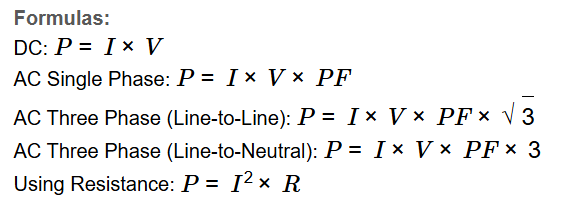1. What is the Amps to Watts Calculator?
Definition: This calculator converts current in amps to power in watts for DC and AC circuits, using voltage or resistance. It supports DC, AC single-phase, and AC three-phase circuits with line-to-line or line-to-neutral voltage.
Purpose: It is used in electrical engineering to determine power consumption based on current, aiding in circuit design and troubleshooting.
2. How Does the Calculator Work?
The calculator uses the following formulas:
Formulas:
- DC: \( P = I \times V \)
- AC Single Phase: \( P = I \times V \times PF \)
- AC Three Phase (Line-to-Line): \( P = I \times V \times PF \times \sqrt{3} \)
- AC Three Phase (Line-to-Neutral): \( P = I \times V \times PF \times 3 \)
- Using Resistance: \( P = I^2 \times R \)
where:
- \( P \): Power in watts (W)
- \( I \): Current in amps (A)
- \( V \): Voltage in volts (V)
- \( PF \): Power factor (0-1)
- \( R \): Resistance in ohms (\(\Omega\))
Steps:
- Select calculation mode: Using Voltage or Using Resistance.
- If Using Voltage, select circuit type: DC, AC Single Phase, or AC Three Phase.
- If AC Three Phase, select voltage type: Line to Line or Line to Neutral.
- Enter current in amps (default 15).
- If Using Voltage, enter voltage in volts (default 120).
- If AC, enter power factor (default 0.8).
- If Using Resistance, enter resistance in ohms (default 10).
- Calculate the power, rounded to 4 decimal places.
3. Importance of Amps to Watts Conversion
Calculating amps to watts is crucial for:
- Electrical Design: Ensures proper power levels for devices and circuits.
- Power Systems: Helps in sizing components for DC and AC systems.
- Troubleshooting: Identifies issues in power delivery.
4. Using the Calculator
Examples:
- Example 1 (DC Using Voltage): 15 A, 120 V:
- Power: \( 15 \times 120 = 1800 \) W
- Result: Power = 1800.0000 W
- Example 2 (AC Single Phase): 15 A, 120 V, PF 0.8:
- Power: \( 15 \times 120 \times 0.8 = 1440 \) W
- Result: Power = 1440.0000 W
- Example 3 (AC Three Phase Line-to-Line): 15 A, 208 V, PF 0.8:
- Power: \( 15 \times 208 \times 0.8 \times \sqrt{3} \approx 4320 \) W
- Result: Power = 4320.0000 W
- Example 4 (Using Resistance): 15 A, 10 \(\Omega\):
- Power: \( 15^2 \times 10 = 2250 \) W
- Result: Power = 2250.0000 W
5. Frequently Asked Questions (FAQ)
Q: What is Watt’s Law?
A: Watt’s Law states that power (P) is equal to current (I) times voltage (V), or P = I × V.
Q: Why include power factor for AC?
A: Power factor accounts for the phase difference between current and voltage in AC circuits.
Q: What is the difference between line-to-line and line-to-neutral voltage?
A: Line-to-line is the voltage between two phases, while line-to-neutral is between a phase and neutral. In three-phase, V_{L-L} = V_{L-N} × √3.
Q: What are common applications?
A: Used in power supplies, electrical installations, and renewable energy systems.
Amps to Watts Calculator© - All Rights Reserved 2025
 Home
Home
 Back
Back
